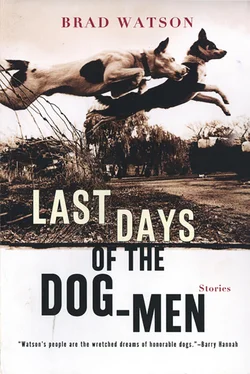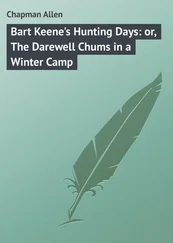We passed our winter boarded up in the house, the cracks beneath doors and around windows and in the walls stuffed with old horse blankets and newspaper and wads of clothing falling apart at the seams, the space heaters hissing in the tall-ceilinged rooms. We went out for whiskey and dry goods and meat, occasionally stopped by the Blind Horse of an early afternoon, but spent our evenings at home. We wrote letters to those we loved and missed and planned spring reunions when possible. Harold’s once-illicit lover, Sophia the surveyor, came by a few times. I wrote Lois, but received no reply. I wrote to my editor at the Journal and asked to return in the late spring, but it may be that I should move on.
It is March just now, when the ancients sacrificed young dogs and men to the crop and mixed the blood with the com. Harold is thinking of planting some beans. We’ve scattered the astonished heads of bream in the soil, mourning doves in their beautiful lidded repose. The blood of the birds and the fishes, and the seeds of the harvest. I found the skin of our resident chicken snake, shed and left on the hearth. He’s getting ready to move outside. The days are warming, and though it’s still cool in the evenings we stay out late in the backyard, sipping Harold’s Famous Grouse to stay warm, trying in our hearts to restore a little order to the world. I’m hoping to be out here at least until midnight, when Canis Major finally descends in the west, having traveled of an evening across the southern horizon. It rises up before sunset and glows bright above the pastures at dusk, big bright Sirius the first star in the sky, to wish upon for a fruitful planting. It stirs me to look up at them, all of them, not just this one, stirs me beyond my own enormous sense of personal disappointment. And Harold, in his cups, calls Otis over and strikes a pose: “Orion, the hunter,” he says, “and his Big Dog.” Otis, looking up at him, strikes the pose, too: Is there something out there? Will we hunt? Harold holds the pose, and Otis trots out into the field, restless, snuffling. I can feel the earth turning beneath us, rolling beneath the stars. Looking up, I lose my balance and fall back flat in the grass.
If the Grouse lasts we’ll stay out till dawn, when the stellar dog and hunter are off tracing the histories of other worlds, the cold distant figures of the hero Perseus and his love Andromeda fading in the morning glow into nothing.
And then we will stumble into the falling-down house and to our beds. And all our dreams will roll toward the low point in the center of the house and pool there together, mingling in the drafts under the doors with last year’s crumbling leaves and the creeping skinks and the dreams of the dogs, who must dream of the chase, the hunt, of bitches in heat, the mingling of old spoors with their own musty odors. And deep in sleep they dream of space travel, of dancing on their hind legs, of being men with the heads and muzzles of dogs, of sleeping in beds with sheets, of driving cars, of taking their fur coats off each night and making love face to face. Of cooking their food. And Harold and I dream of days of following the backs of men’s knees, and faint trails in the soil, the overpowering odors of all our kin, our pasts, every mistake as strong as sulfur, our victories lingering traces here and there. The house is disintegrating into dust. The end of all of this is near.
Just yesterday Harold went into the kitchen for coffee and found the chicken snake curled around the warm pot. Otis went wild. Harold whooped. The screams of Sophia the surveyor rang high and clear and regular, and in my half-sleep I could only imagine the source of this dissonance filling the air. Oh, slay me and scatter my parts in the field. The house was hell. And Ike, too, baying — out on the porch — full-lunged, without memory or sense, with only the barking of Otis to clue his continuing: already lost within his own actions, forgetting his last conscious needs.
THE DOG CAME TO THE CURB’S EDGE AND STOPPED. The man holding on to his halter stopped beside him. Across the street, the signal flashed the words “Don’t Walk.” The dog saw the signal but paid little notice. He was trained to see what mattered: the absence of moving traffic. The signal kept blinking. The cars kept driving through the intersection. He watched the cars, listened to the intensity of their engines, the arid whine of their tires. He listened for something he’d become accustomed to hearing, the buzz and tumbling of switches from the box on the pole next to them. The dog associated it with the imminent stopping of the cars. He looked back over his right shoulder at the man, who stood with his head cocked, listening to the traffic.
A woman behind them spoke up.
“Huh,” she said. “The light’s stuck.”
The dog looked at her, then turned back to watch the traffic, which continued to rush through the intersection without pause.
“I’m going down a block,” the woman said. She spoke to the man. “Would you like me to show you a detour? No telling how long this light will be.”
“No, thank you,” the man said. “We’ll just wait a little bit. Right, Buck?” The dog looked back over his shoulder at the man, then watched the woman walk away.
“Good luck,” the woman said. The dog’s ears stood up and he stiffened for just a second.
“She said ‘luck,’ not ‘Buck,’ ” the man said, laughing easily and reaching down to scratch the dog’s ears. He gripped the loose skin on Buck’s neck with his right hand and gave it an affectionate shake. He continued to hold the halter guide loosely with his left.
The dog watched the traffic rush by.
“We’ll just wait here, Buck,” the man said. “By the time we go a block out of our way, the light will’ve fixed itself.” He cleared his throat and cocked his head, as if listening for something. The dog dipped his head and shifted his shoulders in the halter.
The man laughed softly.
“If we went down a block, I’ll bet that light would get stuck, too. We’d be following some kind of traveling glitch across town. We could go for miles, and then end up in some field, and a voice saying, ‘I suppose you’re wondering why I’ve summoned you here.’ ”
It was the longest they’d ever stood waiting for traffic to stop. The dog saw people across the street wait momentarily, glance around, then leave. He watched the traffic. It began to have a hypnotic effect upon him: the traffic, the blinking crossing signal. His focus on the next move, the crossing, on the implied courses of the pedestrians around them and those still waiting at the opposite curb, on the potential obstructions ahead, dissolved into the rare luxury of wandering attention.
The sounds of the traffic grinding through the intersection were diminished to a small aural dot in the back of his mind, and he became aware of the regular bleat of a slow-turning box fan in an open window of the building behind them. Odd scents distinguished themselves in his nostrils and blended into a rich funk that swirled about the pedestrians who stopped next to them, a secret aromatic history that eddied about him even as the pedestrians muttered among themselves and moved on.
The hard clean smell of new shoe leather seeped from the air-conditioned stores, overlaying the drift of worn leather and grime that eased from tiny musty pores in the sidewalk. He snuffled at them and sneezed. In a trembling confusion he was aware of all that was carried in the breeze, the strong odor of tobacco and the sharp rake of its smoke, the gasoline and exhaust fumes and the stench of aging rubber, the fetid waves that rolled through it all from garbage bins in the alleys and on the backstreet curbs.
He lowered his head and shifted his shoulders in the harness like a boxer.
Читать дальше











